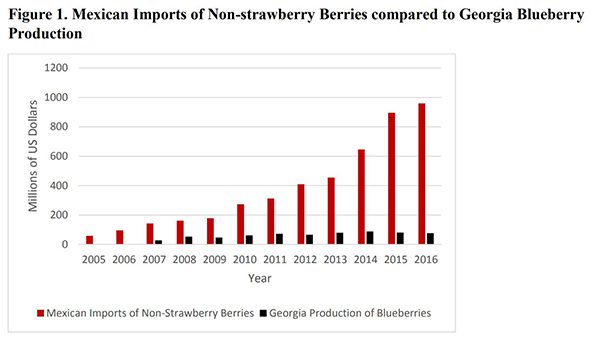Source: University of Georgia
Economic impact models released by the University of Georgia show potentially “catastrophic” damage to the state’s fresh produce industry under the Trump Administration’s U.S. Mexico Canada Agreement.
The Policy Brief, authored by Jeffrey H. Dorfman, Julian W. Worley, and Sharon P. Kane of the Agricultural and Applied Economics Department at UGA suggests job losses from 3,300 to 8,600 and financial losses from $340 million to $900 million.
“The state is on track to lose nearly one billion dollars in annual economic output and over 8,000 jobs unless something occurs to slow down the increase in lowpriced (sic) Mexican imports of blueberries and vegetables,” the brief said. “On a county-by-county basis, the losses in a few cases will likely reach economic damage rarely seen since the Great Depression.”
Economists studied blueberry, bell pepper, cucumber, eggplant, squash, and tomato production in Georgia compared to Mexican imports and concluded Mexico’s growing season has expanded to overlap and overtake Georgia in the marketplace.
“In recent years Mexico has greatly expanded the weeks during which their imports compete directly with Georgia fruits and vegetables,” the brief said. “Georgia’s natural seasonal advantage has been diminished by Mexican imports arriving during Georgia’s selling season at prices well below Georgia’s production costs.”
The brief suggests the new USMCA – the Trump Administration’s replacement for the North American Free Trade Agreement, or NAFTA – needs to be renegotiated.
“The new USMCA as currently constituted contains no provision to protect American producers from seasonal damage or government subsidies, providing no remedy or relief mechanism to preserve the ability of American growers to compete fairly with Mexican imports,” the brief said. “Thus, unless the current deal is amended, these Mexican imports can cause extensive economic damage to Georgia (and American) fruit and vegetable growers with no remedy available to American growers.”
The USMCA was signed by Mexican President Enrique Peña Nieto, Canadian Prime Minister Justin Trudeau and President Trump on November 30, but has not yet been ratified by Congress.
Read a copy of the University of Georgia’s Policy Brief here.
Economic impact models released by the University of Georgia show potentially “catastrophic” damage to the state’s fresh produce industry under the Trump Administration’s U.S. Mexico Canada Agreement.
The Policy Brief, authored by Jeffrey H. Dorfman, Julian W. Worley, and Sharon P. Kane of the Agricultural and Applied Economics Department at UGA suggests job losses from 3,300 to 8,600 and financial losses from $340 million to $900 million.
“The state is on track to lose nearly one billion dollars in annual economic output and over 8,000 jobs unless something occurs to slow down the increase in lowpriced (sic) Mexican imports of blueberries and vegetables,” the brief said. “On a county-by-county basis, the losses in a few cases will likely reach economic damage rarely seen since the Great Depression.”
Economists studied blueberry, bell pepper, cucumber, eggplant, squash, and tomato production in Georgia compared to Mexican imports and concluded Mexico’s growing season has expanded to overlap and overtake Georgia in the marketplace.
“In recent years Mexico has greatly expanded the weeks during which their imports compete directly with Georgia fruits and vegetables,” the brief said. “Georgia’s natural seasonal advantage has been diminished by Mexican imports arriving during Georgia’s selling season at prices well below Georgia’s production costs.”
The brief suggests the new USMCA – the Trump Administration’s replacement for the North American Free Trade Agreement, or NAFTA – needs to be renegotiated.
“The new USMCA as currently constituted contains no provision to protect American producers from seasonal damage or government subsidies, providing no remedy or relief mechanism to preserve the ability of American growers to compete fairly with Mexican imports,” the brief said. “Thus, unless the current deal is amended, these Mexican imports can cause extensive economic damage to Georgia (and American) fruit and vegetable growers with no remedy available to American growers.”
The USMCA was signed by Mexican President Enrique Peña Nieto, Canadian Prime Minister Justin Trudeau and President Trump on November 30, but has not yet been ratified by Congress.
Read a copy of the University of Georgia’s Policy Brief here.
Pamela Riemenschneider is the Retail Editor for Blue Book Services.



